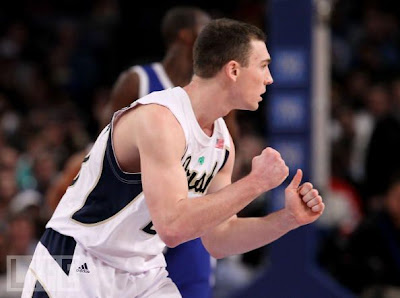 From the Omaha World Herald:
From the Omaha World Herald:Jahenns Manigat went from lost freshman to a guy his Creighton teammates look to for direction in the span of a calendar year.
That rapid transformation is not lost on Bluejay coach Greg McDermott.
"He's made as good of a stride in one year as anyone I've been around," McDermott said.
His teammates' respect for the progress Manigat has made is shown in their selection of the sophomore guard from Ontario, Canada, as one of Creighton's three captains.
"He's our gel guy. He's everyone's best friend," Creighton forward Ethan Wragge said. "He deserves to be captain because he communicates the best."
That part, at least off the court, comes easily for Manigat. He's a gregarious jokester, that guy who keeps the locker room loose with a comment that cuts through the tension a long season creates.
But just as he's had to work to develop his skills, Manigat said he's had to put in time to become the team's vocal leader once the ball is tipped.
"Off the court, I have a pretty good personality and I've never been shy around people," he said. "But being vocal on the court is something totally different. It's about the stuff that needs to be communicated when you're playing games — helping guys through screens and making sure guys know where they're supposed to be.
"I think having a vocal leader was one of the things that was missing on last year's team, and I really didn't want us to struggle because of that. I'm just trying to make sure everyone is doing what they're supposed to be doing."
Talk alone will only get a player so far. Manigat is backing up his words with an improved game on both ends of the court. Offensively, he scored 33 points in Creighton's first two wins. Defensively, he continues to show the growth that first started blossoming at the end of last season.
"The last 10 or 12 games of last season," McDermott said, "Jahenns was really doing some really good things. But he's taken it to another level this year with his leadership, his communication and his intensity on the defensive end of the floor."
Manigat started Creighton's final 15 games last season. He averaged 8.1 points and shot 55 percent from the field in the final 14. He often found himself matched up against the opposing team's best backcourt player.
Manigat used last season's solid finish as a base to build on this season.
"He really got into the gym and worked on getting a lot of 3s up," forward Doug McDermott said. "He knew he was going to get a lot of 3s because our frontcourt draws a lot of defenders."
Seventeen of the 18 shots Manigat has attempted this season have come from behind the arc. He's made 10 of the shots (58.8 percent) and also has seven assists while committing only two turnovers.
That's not the kind of production that his coach anticipated he'd be getting from Manigat when he first joined the program.
"A year ago, Jahenns was an awful defender and he really didn't understand how to play the game offensively," McDermott said. "He's really bought into what we've asked him to do, and I'm glad he's on our team. He's going to have a great career here."
Manigat's early struggles had him wondering what he had gotten himself into — he was the final recruit signed by former coach Dana Altman in April 2010. Altman left for Oregon later that month.
Like many freshmen, Manigat struggled to adjust to the speed and intensity of the collegiate game when he first got on campus.
"I remember after one early individual workout asking myself what was keeping me from getting on a plane and going back home," Manigat said. "That's something a lot of freshmen go through when the realization of how tough college basketball is hits them.
"I think a lot of the things I went through got me to where I am today. I'm a better player, more level-headed and more mature."
That experience has Manigat mentoring the new players that joined the program this season.
"I'm trying to help them through that transition," Manigat said.
His willingness to embrace such a role is one reason his teammates voted him a captain along with senior Antoine Young and junior Grant Gibbs. McDermott said it's the first time in his coaching career that a sophomore had been selected as one of the captains.
It's a responsibility that Manigat takes seriously.
"I'm honored," he said. "It's truly a special group. These guys really and truly are for me, being so far away from home, my brothers. I'm going to do everything I can to represent them and to help us have the kind of season that we all want."







































